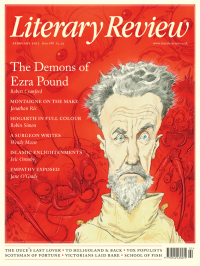Jonathan Barnes
I Confess
Moonglow
By Michael Chabon
Fourth Estate 430pp £18.99
In Michael Chabon’s last major novel, Telegraph Avenue, published in 2012 and set eight years earlier, one of the book’s characters encounters, at a political fundraiser, a figure who is at that time of still greater significance to the reader than to her – one Barack Obama. First spied grooving along to the hired band, ‘tapping his foot, bobbing his close-cropped head’ and remarking that ‘those guys are pretty funky’, the future president, then merely a state senator, cameos in a single scene, dispensing advice that goes on to help the heroine’s marriage. Observing her dreamy, erratic guitarist husband, Obama delivers the following soliloquy: ‘traveling around, campaigning, at home, around the country, I have seen a lot of people, met a lot of people. The lucky ones are the people like your husband there. The ones who find work that means something to them. That they can really put their heart into, however foolish it might look to other people.’ A lifelong Democrat, Chabon provides a sympathetic portrait of ‘the rising star from Illinois’, one that just succeeds in ducking hagiography. At the time of its release, this wry interaction was a well-meaning boost for a leader mired in domestic unpopularity and governmental gridlock. Today, now that the ultimate American vulgarian has ascended to high office, trailed by clouds of crypto-fascists, the vignette reads as a bitterly ironic portrait of a politician whose work is set to be undone.
Moonglow, Chabon’s new book, seems similarly naive about the future. A portrait of an unnamed old man who is dying of bone cancer, it seeks to provide a depiction of a lost America, from the 1930s to the turn of the century. In doing so, it comes across as altogether

Sign Up to our newsletter
Receive free articles, highlights from the archive, news, details of prizes, and much more.@Lit_Review
Follow Literary Review on Twitter
Twitter Feed
Under its longest-serving editor, Graydon Carter, Vanity Fair was that rare thing – a New York society magazine that published serious journalism.
@PeterPeteryork looks at what Carter got right.
Peter York - Deluxe Editions
Peter York: Deluxe Editions - When the Going Was Good: An Editor’s Adventures During the Last Golden Age of Magazines by Graydon Carter
literaryreview.co.uk
Henry James returned to America in 1904 with three objectives: to see his brother William, to deliver a series of lectures on Balzac, and to gather material for a pair of books about modern America.
Peter Rose follows James out west.
Peter Rose - The Restless Analyst
Peter Rose: The Restless Analyst - Henry James Comes Home: Rediscovering America in the Gilded Age by Peter Brooks...
literaryreview.co.uk
Vladimir Putin served his apprenticeship in the KGB toward the end of the Cold War, a period during which Western societies were infiltrated by so-called 'illegals'.
Piers Brendon examines how the culture of Soviet spycraft shaped his thinking.
Piers Brendon - Tinker, Tailor, Sleeper, Troll
Piers Brendon: Tinker, Tailor, Sleeper, Troll - The Illegals: Russia’s Most Audacious Spies and the Plot to Infiltrate the West by Shaun Walker
literaryreview.co.uk